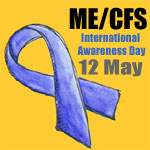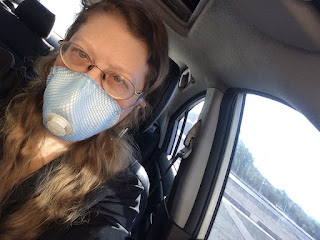 It's that time again. I honestly wasn't sure if it was worthwhile to do another post about ME Awareness Day. It's hard to say anything new after writing these for 13 years, and nobody really reads blogs anymore. I posted something about this last night in a private Facebook group, and one of the members responded, "What's ME?"
It's that time again. I honestly wasn't sure if it was worthwhile to do another post about ME Awareness Day. It's hard to say anything new after writing these for 13 years, and nobody really reads blogs anymore. I posted something about this last night in a private Facebook group, and one of the members responded, "What's ME?"
Okay, okay, I guess we're doing this. Since I don't have anything new to say, let's get back to the basics, starting with an answer to that guy's question.
What's ME?
A disease. "ME" stands for myalgic encephalomyelitis. It's more commonly known as "chronic fatigue syndrome."
Oh, chronic fatigue syndrome! Yeah, I've heard of that. I don't get what the big deal is, though. I get tired too.
ME isn't just being tired. Symptoms vary from person to person, but commonly include:
- Chronic, debilitating pain
- Post-exertional neuroimmune exhaustion—symptoms get worse after physical or mental exertion and require an extended recovery period
- Greater susceptibility to fatal cancers and heart failure
- Flu-like symptoms, such as joint and muscle pain
- Cognitive impairment, including problems with short-term memory
- Crushing fatigue, which is not relieved by rest
- Other common symptoms include cardiac arrhythmias, chemical sensitivities, food sensitivities, blurry vision, eye pain, irritable bowel syndrome, and a host of other conditions that are nasty in their own right
Huh. Some of that sounds kind of like long covid.
Yeppers. They're both post-viral syndromes, and while long covid has some symptoms not present in ME (loss of smell, "covid toes"), there's quite a bit of overlap. The ME community was predicting that long covid would become a thing before there were any documented cases. Please, please, if you're not someone who has bad reactions to vaccines generally, PLEASE get vaccinated. Vaccination doesn't guarantee that you won't get infected, but it does reduce the odds that you'll die, be hospitalized, or contract long covid.
A friend of mine says she has this thing, but every time I see her, she seems fine. I think she's a hypochondriac.
Probably not. It's typical for sufferers to have good days and bad days (though a "good day" can still be pretty awful from a healthy person's perspective). If you see someone with ME out and about, you've probably caught them on a good day. You don't see them lying flat on their back for the rest of the week, in the privacy of their own home, recovering from their trip to the grocery store.
Maybe they just need more exercise.
Exercise is extremely dangerous for people with ME. If they push themselves too hard, they'll make themselves worse—possibly much worse—not better. Also, if you barely had enough energy to feed yourself each day, would you waste it on push-ups?
If it's not psychological, and it's not due to lack of exercise, then what causes ME?
Probably a combination of genetic and environmental factors, but nobody knows the specifics.
Is there a cure?
No.
Any hope for a cure sometime soon?
Hard to say. More research is needed. Problem is, this disease still gets inadequate funding, largely due to the perception that it's not a real thing. Much of what it has gotten has gone toward questionable psychological research.
That's messed up.
Yeah.
What about treatments?
There have been a few advancements on this front in recent years, though no one-size-fits-all therapy. Some people have benefited from tethered cord surgery. Evidence suggests that some patients might benefit from a low dose of the dopamine-modulating drug aripiprazole, although further research is needed.
Is there anything I can do to help?
Yes! The most important thing right now is funding. We need more research to find out what causes ME and, eventually, discover effective treatments. Donate to the Open Medicine Foundation to help this along.
Cool. Anything else I can do?
Absolutely there is. Here are just a few things.
- If you know someone with ME, don't automatically assume they should get psychiatric help or suck it up because you "feel tired too sometimes." If this person wasn't a neurotic pathological liar before getting sick, it's unlikely they've suddenly turned into one. (Same goes for people with Lyme disease, fibromyalgia, multiple chemical sensitivities, and other invisible illnesses.)
- Participate in #MillionsMissing.
- Accompany the sufferer in your life to doctors' appointments. This serves two purposes. First, if you know enough about the person's symptoms, you can remind them of questions they wanted to ask if they're fogged and forget. Second, doctors who don't acknowledge the reality of ME tend to display better manners when there's a healthy witness present. I'm not sure why this is. Maybe rude doctors don't feel they can bully healthy people as easily; maybe the healthy person's belief in the sick person's illness lends it more credibility. In any case, it works.
- Quit calling it "chronic fatigue syndrome." Before someone invented that name, it was called myalgic encephalomyelitis. Refer to it as ME and the response will likely be "What's that?" rather than "Whatever, I get tired too."
- If someone else calls it chronic fatigue syndrome, correct them without being annoyingly self-righteous about it. For instance, "It was called myalgic encephalomyelitis until 1988, when the insurance lobbyists got involved."
- If you have trouble pronouncing myalgic encephalomyelitis (my-AL-jik en-SEH-fa-lo-my-el-I-tis), just say ME.
- Share Everybody Knows About Me, our song about living with undiagnosed ME.
- If you're a creative type yourself, create something of your own—a song, a painting, an essay—that helps people understand. Sometimes it's easier to communicate through art than facts, regardless of how true and compelling the facts are.







